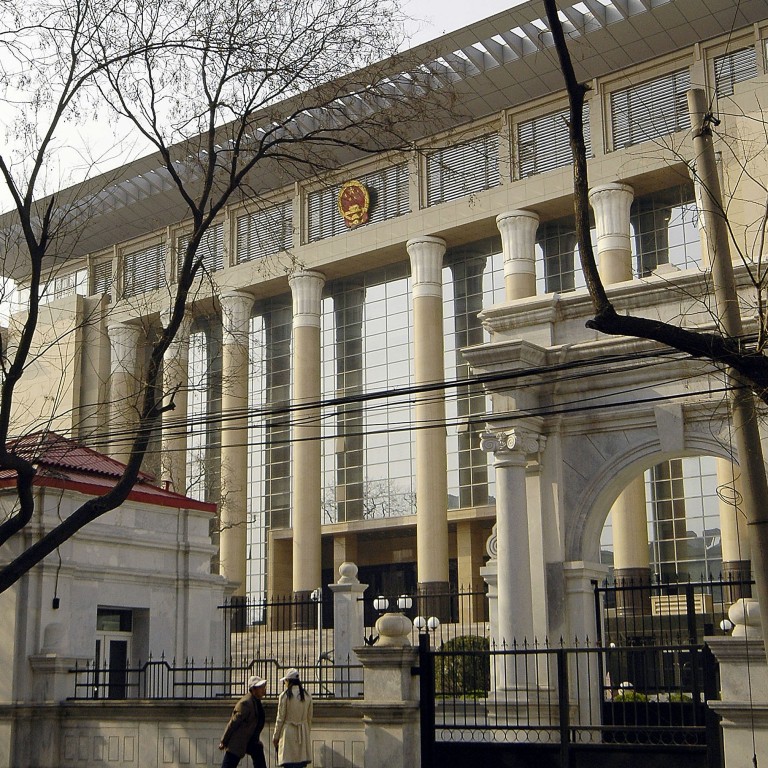
Chinese bank employee convicted of ‘leaking state secrets’ after sharing policy draft on WeChat
- Langfang Bank employee seconded to the China Banking Regulatory Commission photographed the draft of a new wealth management product regulation
- The draft quickly went viral via WeChat, causing a ‘disastrous impact on China’s financial regulation’
China has convicted a local bank employee of “leaking state secrets” after she shared a draft of a top secret financial policy document with people outside the government, according to a recently released verdict.
The draft was widely circulated on social media and later reported by Bloomberg and “had a disastrous impact on China’s financial regulation,” the court’s written ruling said.
The document, drafted by the central bank and titled “Guidance on Regulating the Asset Management Business of Financial Institutions”, aimed to apply macroprudential oversight to China’s unwieldy asset management industry, which controls over 100 trillion yuan in assets. Specifically, it banned financial institutions from guaranteeing that investments would break even or offering excessively high returns on wealth management products.
Li was given a one-year suspended sentence by Jizhou District Court in Hengshui, Hebei province, meaning she will not spent time in prison unless she commits anther offence.
The draft was still in an early stage of development and internal consultation, and it was classified clearly as confidential on the first page.
In recent years, there has been a significant increase in the issuance of asset management products in China, with promises of much higher returns than available from regular bank deposits. The authorities had encouraging this as part of its financial liberalisation policy, aimed at lessening the dependence on the banking system for fundraising.
But liquidity risks grew rapidly, prompting banking regulators to began drafting regulations in 2016, which included banning implicit investment guarantees.
The defendant, identified only by her family name Li, was a 32-year-old employee of Langfang Bank who was on a secondment to the China Banking Regulatory Commission (CBRC), which gave her the access to the draft proposal. In February 2017, Li took 36 photos of the draft and sent them to her colleague surnamed Cui at Langfang Bank via Chinese messaging service WeChat.
Cui sent the photos to another colleague, surnamed Fei, who forwarded them to his subordinates in a WeChat group, and one of the subordinates then forwarded the photos to an analyst at CIB Research, a banking research company.
Bloomberg faxed the central bank a request for an interview right after seeing the post, which had a disastrous impact.
The analyst shared the photos to two more WeChat groups, where one of the members compiled the photos into a PDF document. The document was spread to more WeChat groups and finally went viral on social media.
“Bloomberg faxed the central bank a request for an interview right after seeing the post, which had a disastrous impact” on market sentiment, said court documents.
“The draft was still in an early stage of development and internal consultation, and it was classified clearly as confidential on the first page.”
The draft was published for public review nine months after the leak and went into effect in April 2018 with some amendments, but only after significant damage had been done to the market.
“Li was on a secondment to the CBRC. She had not been systematically trained on confidentiality, so the leak was not caused deliberately,” said Li’s lawyers, according to the written verdict.
Li was on a secondment to the CBRC. She had not been systematically trained on confidentiality, so the leak was not caused deliberately.
Before the draft was leaked, financial institutions sold a total of 168 trillion yuan (US$25 trillion) worth of wealth management products in 2016. There was a slight increase in total sales to 174 trillion yuan in 2017, but sales plunged by 32 per cent to 118 trillion yuan in 2018 after the new rules were implemented.
“Confidentiality will be specially addressed in orientation at our bank. Supervisors will conduct spot check from time to time to see whether we remember the 10 disciplines well,” an employee at China Merchants Bank said.
He added that information at the bank is classified into different levels and is only accessible via intranet. The bank is also required to conduct self-inspections to check whether any employee has accessed or leaked sensitive data or confidential information.
“Li has definitely violated the regulation, but why a document of industrial regulations could be classified as state secret before release? It is difficult to directly relate the bad economic data to her behaviour and it is unfair to blame Li for the slump in the whole financial industry,” said Xu Chendi, a lawyer at Beijing Zhongwen Law Firm.
Both of Li’s lawyers did not respond when asked for further comment by the South China Morning Post.

